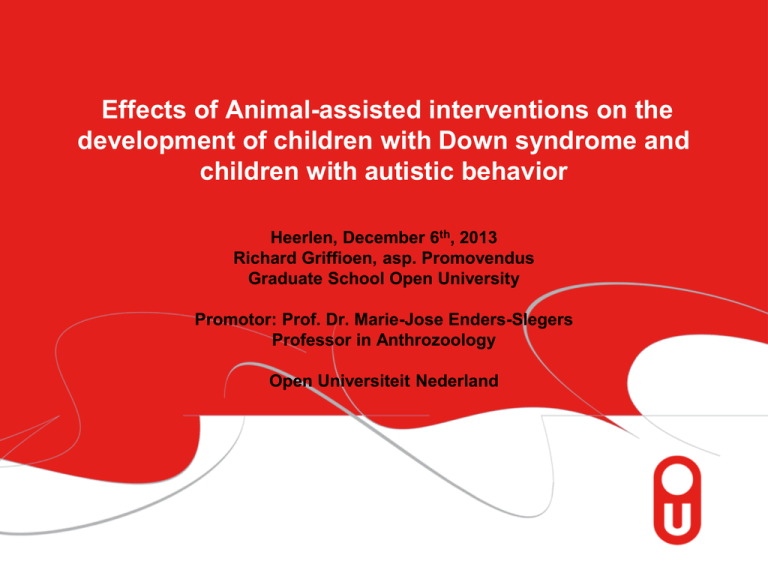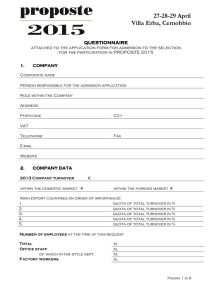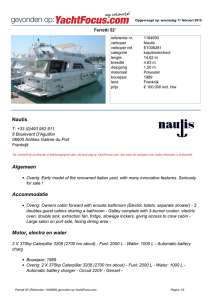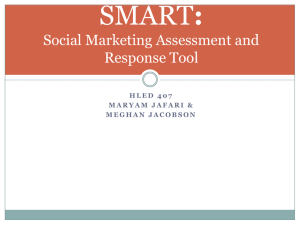Dolphin-assisted interventions
advertisement

Effects of Animal-assisted interventions on the development of children with Down syndrome and children with autistic behavior Heerlen, December 6th, 2013 Richard Griffioen, asp. Promovendus Graduate School Open University Promotor: Prof. Dr. Marie-Jose Enders-Slegers Professor in Anthrozoology Open Universiteit Nederland pagina 1 Theoretical Framework Developmental psychology (and behavioral psychology). Daniel N. Stern, The interpersonal world of the infant. Self Psychology, Attachment theory pagina 2 Hypothesis The interaction with animals will have a positive supportive effect on the development of social interactions and language development in children with special needs. pagina 3 Dolphin-assisted interventions The effect of Dolphin-assisted therapy on the cognitive and social development of children with Down syndrome Research completed Paper submitted, reviewed and re-submitted (July 2013); Anthrozoös, A multidisciplinary journal of the interactions of people and animals pagina 4 Dolphin-assisted interventions Research Characteristics • The effect on the cognitive and social development • • • • pagina 5 Children with Down Syndrome N=44 Pre-post and follow-up measurement Cross-over design, 2 control groups Dolphin-assisted interventions Number of participants in various groups at various intervals pagina 6 * total of 43 instead of 44 at T3 as one questionnaire was not returned. **At T5 several questionnaires have not been returned Dolphin-assisted interventions Procedures (1) • Interventions at Dolphinarium Harderwijk, the Netherlands • • • • • pagina 7 Open water Lagoon 17 bottlenose dolphins Well-being of the dolphins is monitored No swim program!! 6 week program, once a week Dolphin-assisted interventions Procedures (2) • DAT group Behavioral approach Teaching different tasks Exercise speech and language tasks • Control group (swimming pool) Same exercises, positive rewarded (play with radio-controlled ship) • Control group (waiting list) No interventions pagina 8 Dolphin-assisted interventions MESSIER Questionnaire • • • • • pagina 9 Verbalization Impulsiveness Contact Understanding of rules Recognition Dolphin-assisted interventions Results / conclusions (repeated measures ANOVA) Control group (T1-T2): • no signifcant improvement for any of the variables DAT group (T3-T4), significant improvement of: • verbalization (f=3,755; p=0,036) • recognition (f=4,426; p=0,026) Follow-up (T5): pagina 10 • verbalization continued to increase • recognition slightly decreased Pending research Dolphin-assisted therapy and Down syndrome (qualitative and quantitative analysis using video registration). Data collection completed The qualitative analysis is to explain to what is seen, for example taking initiative or facial expressions of the children. Questions to answer are: what does it mean if the child is, for example, making eye contact, do you see relaxation and how is this exposed. Factors to analyze: self-confidence, self-esteem, increasing concentration, increasing initiative of the child, decreasing anxiety. pagina 11 Proposed research Equine-assisted interventions The effect of equine-assisted therapy on the behaviour (social interaction) and language development of children with autism and children with Down syndrome. Design: • 1 hour of structured interaction, 12 weeks, once a week. • interaction to be standardized to make comparison between results possible. • study the behavior of horses and children during their interaction. (Using interact software.) • Observations, for example: making eye contact and verbal and nonverbal interaction, having fun, laughing etc. Children Behaviour Check List, Teacher Report Form Video recording pagina 12 Proposed research Dog-assisted interventions The effect of dog-assisted therapy on the oxytocin and cortisol levels of children whith autism and children with Down syndrome. Design: 30 minutes of structured interaction, 12 weeks, once a week. interaction to be standardized to make comparison between results possible. (petting, execution of tasks, etc.) study the behavior of dogs and children during their interaction. (Using interact software.) Observations, for example: who is taking initiative and how, making eye contact and verbal and non-verbal interaction, having fun, laughing etc. The interaction will be with the help of trained (service) dogs. Pre, during and post salivary samples CBCL questionnaire Video recording pagina 13 Thank you for listening pagina 14











